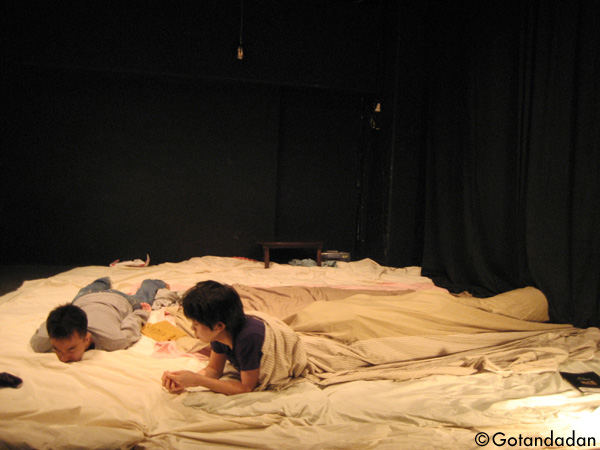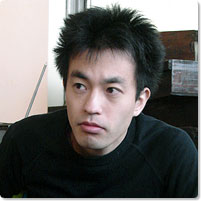In a single room with its floor covered completely by a large futon bedding, “Me” and his girlfriend are lying together looking at an encyclopedia of snakes. From that first scene on, no matter how the setting of the story may change, the stage setting is always this same futon-covered room.
He wants to try in some way to make a story that is told “unconsciously” without violating the integrity of his pre-verbal inner world. For his next play he has the idea of a scenario inn which a great snake symbolizing love swallows the world and becomes one with it.
Calling them presents, the woman gives “Me” two Kishida Drama Awards. It seems she bought them at the Mitsukoshi Department Store. They are things like a gold-plated slabs with rounded corners. Choked with emotion, he says at the award press conference that he is donating one of them to a poor country named Maturn. It is a country that you can apparently reach in about eight hours by night bus from Shinjuku. The bus driver is a squirrel. When he returns home to announce his departure to Maturn, his woman has been half swallowed by a snake that has come out of the
osiire
closet. Showing only the unconsumed upper half of her body from beneath the futon quilt, she says that she awaits his return.
Arriving in Maturn with one of the actresses from the theater company, they find their driver squirrel killed by a Maturn man they meet. With their driver dead, they have no way of returning to Japan. The two follow the man to his house, where he lives with his father and younger sister. The man tells them that his younger sister is the offspring of a great snake the father had intercourse and that she has already swallowed his mother and older sister and he may be next.
“Me” finally donates the Kishida Drama Award to the man and his family, but not without some misgivings, as it looks from the way it is treated that it will probably end up being used as a hot pad. With his mission now completed, “Me” and the actress re-board the bus with the man, who has volunteered to be their new driver out of a desire to see what the outside world is like. Along the way, the actress, who wanted to take a swim in the sea, is dunked by big waves and begins to drown. “Me” throws in the Kishida Drama Award plaque in lieu of a lifesaver but it is not enough to save her. “Me” is now overcome with grief. Meanwhile, his woman he left back in Japan has now been swallowed up to her neck.
By this point in the play, the “Me” that has been the protagonist until now has begun to overlap in image with another “Me,” namely, the playwright who is writing this play. And, the story itself proceeds on multiple layers. In short, the “next play” that the writer has spoken of early in the play is now actually unfolding here.
At the suggestion of the man from Maturn that they go to meet the star American DJ, Bozono, “Me” decides to go along. The man’s father, who says that it may be worthless to make such a trip because the younger sister has probably swallowed the world, is killed by a yakuza gangster who is out to prevent the trip to America. The woman back in Japan is about to be digested by the snake makes her farewell to “Me.”
When the two finally meet Bozono in the South Bronx, they find the supposedly dead actress and father making an appearance as if nothing had happened and proceed to question the nature of their existence, asking if they might not indeed by phantoms. Now the other characters have all left, leaving only “Me” and younger sister snake, who is rolling over with stomach pain after having swallowed the world. When the sister says that he should give more thought to all the people who have been with them (in the course of the play), “Me” answers that it is too much of a bother. The sister says, “If you have become mixed into the world, shall I give birth to you?” “Me” brings is ear to the stomach of sister to listen to the heartbeat of his own unborn self.



